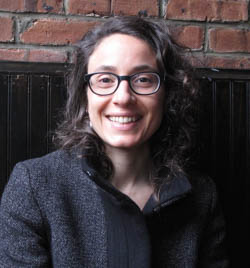Campus News
Institute For Advanced Study selects environmental sociologist Hillary Angelo as a member
UC Santa Cruz Associate Professor of Sociology Hillary Angelo was selected among a group of 25 world-leading researchers and academics who will focus on the theme “Climate Crisis Politics” as 2022-2023 members of the IAS School of Social Science.

UC Santa Cruz Associate Professor of Sociology Hillary Angelo was selected among a group of 25 world-leading social science researchers and academics to be a member of the Institute for Advanced Study (IAS). The Institute’s 2022-2023 members in the School of Social Science will focus on the theme “Climate Crisis Politics,” and Angelo will contribute her expertise as an urban and environmental sociologist.
“I’m really excited to be a part of this, and it’s especially wonderful to see the IAS School of Social Science focusing on climate change,” Angelo said. “It acknowledges the existential importance of this issue for our future, and it’s cultivating good interdisciplinary scholarship, which is exactly the kind of thinking that climate change requires.”
Angelo’s membership in the IAS will include joining a residential community at the Institute’s campus in Princeton, New Jersey, from fall 2022 through spring 2023, during which time she’ll collaborate with other scholars in the cohort and focus on her individual research. She’s currently working on a book that explores how the shift from fossil fuels to renewable energy can either transform or reproduce existing land use policies, perceptions of nature, and political and economic relationships.
In particular, Angelo will study these issues on public lands in the United States, with examples from areas like Bears Ears National Monument, on the border of Utah and Arizona, and deserts in California and Nevada.
“In southern Utah and northern Arizona, we see the decline of fossil fuels and hydropower, and there’s been a big involvement of Indigenous groups, huge recreational interest, and coordinated efforts among natural scientists, archaeologists, and tribes to preserve these landscapes and treat them in new ways,” she said. “I’ve been contrasting that to the buildout of renewable energy in the Nevada and California desert, where some of these new resources are being developed within the same old patterns as fossil fuels.”
Angelo’s member position with the IAS will allow her to focus on writing for the new book, and she also plans to conduct additional archival research. She says she’s grateful for the opportunity to focus on the project and is looking forward to collaborating with IAS members.
“It’s an amazing group of people,” she said. “It’s always exciting to have time to do research and writing, but it’s even better to have time with people who can help me think through new ideas.”